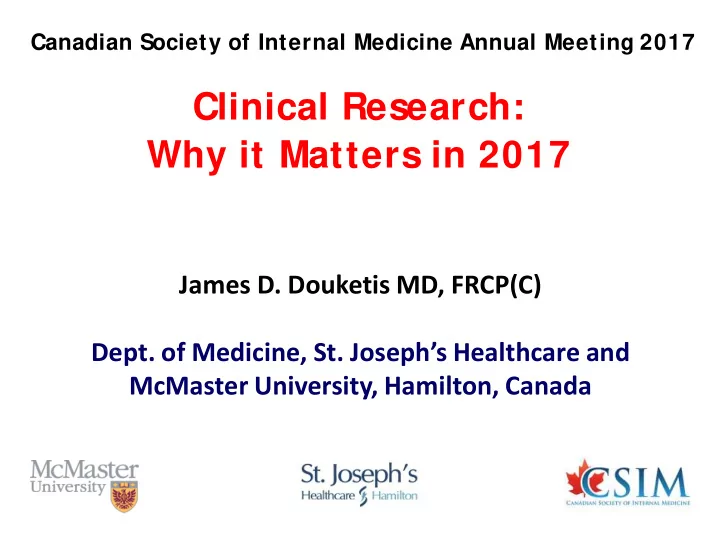

Canadian Society of Internal Medicine Annual Meeting 2017 Clinical Research: Why it Matters in 2017 James D. Douketis MD, FRCP(C) Dept. of Medicine, St. Joseph’s Healthcare and McMaster University, Hamilton, Canada
Lifetime Disclosures and Potential COIs Research Support* CIHR, HSFC, Boehringer-Ingelheim Employee Up-to-Date, Merck Manual Actelion, AGEN, Astra-Zeneca, Bayer, Biotie, Consultant or BMS-Pfizer, Daiichi-Sankyo, Portola, Boehringer- Advisory Board* Ingelheim, Cytori, Janssen, Leo, Medicines Co. Stockholder None Speakers Bureau None Bayer, Boehringer-Ingelheim, BMS-Pfizer, Leo Speaker’s Fees* Pharma, Pfizer, Sanofi *Funds from these sources deposited into university-based research accounts or SJHH Foundation. Last 3 years
Dr. David Sackett (1934-2015) MD (University of Illinois), MSc • (Harvard University) Pioneer of evidence-based medicine • (Archie Cochrane, Alvan Feinstein) General internist • Chair of 1 st worldwide Department • of Clinical Epidemiology (McMaster) Awards include: OC, FRSC, Gairdner • Foundation Wightman Award, Canadian Medical Hall of Fame
Learning Objectives • Abstract • why clinical research matters in 2017 • importance of curiosity • Practical • some do’s and don’ts in clinical research • dealing with ‘what ifs’
The Abstract: How clinical research will help you as a physician… • Career trajectory and diversification... • Ongoing intellectual stimulus… • Compels you to think creatively and critically… making you a better physician
Curiosity and ideas as foundations for clinical research… asking questions “ What is the question ?” Keeping the question simple Keeping it relevant Have I asked the ‘right question’?
Has technology blunted our curiosity (… and humanity)? … are we connecting with our patient or the EMR screen? ‘… is there an app for that ?’ versus … listening (and writing about) the patient’s story (narrative medicine)
Are there too many barriers to pursuing a career in clinical research? “… too busy with clinical work, paying off debts and exploring job opportunities… ” “… there are too many administrative and other barriers … ” “… I am not good at writing, especially grants … ” “… all the important clinical questions have been answered … ”
A few emerging research domains… • Knowledge translation research ▫ Is the evidence getting through… ? • Quality, outcome, behaviour based research ▫ e.g., ‘Choosing Wisely’… is it working? • Big data research (what RCTs can’t do) ▫ e.g., administrative databases (ICES, CIHI) • Emerging technologies and medicine ▫ e.g., hand-held diagnostic devices, AI
The Practical: Some Do’s and Don’ts… (1) Do trust your supervisor’s judgement • Their experience will steer you in the right path. Don’t trust your supervisor’s judgement • Their experience may be biased towards their own priorities.
Some Do’s and Don’ts… (2) Do think of your own ideas for projects ▫ You are more likely to be committed if you have ownership of the project. Don’t quickly accept that your ideas lack merit Be respectful but wary of naysayers. •
Some Do’s and Don’ts… (3) Do maintain your commitment and integrity • Focus on your ideas and maintain your integrity despite potential ‘situational stresses’ from peers/institutions to do otherwise. Don’t burn bridges • Research world is small; there is no value to create antagonisms with colleagues or institutions.
Some Do’s and Don’ts… (4) Do think big ▫ Be ambitious in your goals, ideas do not cost anything… curiosity is of paramount importance. Don’t think too big… sometimes Temper ambition with practicality. • Set aside more ambitious projects for • another time.
‘What ifs’ for aspiring clinician investigators… • What if I don’t know how to write grants? • What if I don’t know anybody in research? • What if I am at a non-research centre? • What if I am in an ‘intimidating’ large research centre? • What if I don’t want to commit to “75% research and 25% clinical” model?
Some answers… 1) Get involved in regional, national, international societies or working groups related to the topic of interest… make contacts, explore your interests 2) Develop focused expertise (e.g. systematic or narrative literature reviews… learn, generate ideas and hypotheses, share
Some answers… 3) propose sub-studies involving pre-existing trials or databases… low-cost ways to develop and execute a research protocol 4) Learn to live with what you have… but have multiple ‘irons in the fire’ 5) You don’t have to adopt the ‘75-25 model’… more flexibility allowed in 2017
Some personal considerations…
Collegiality and friendships…
Career in GIM and clinical research… • Proud to be a general internist • Has facilitated diverse research interests • Has kept me grounded about what matters to practicing clinicians • Enabled my research to remain relevant and practical
Humility and need to recognize failings… … poor track record in mentorship of students in MSc/PhD programs … perhaps not spending enough time teaching on CTU … and not spending enough time with patients
If I can do it… Before MD… • ‘average’ medical student… no awards, etc. • clerkship supervisor advised me to ‘ … not bother applying to internal medicine ’ After MD… • completed ‘rotating internship’ After FRCP… • did not complete MSc program in clinical epidemiol • planned for 1 year clinical thrombosis training
Mentorship and Advocacy: Dr. Jeffrey S. Ginsberg
Inspiration: Constantine Douketis MSc, PhD (1953-2008)
Some final words to consider… • Curiosity • Integrity • Humility
Recommend
More recommend